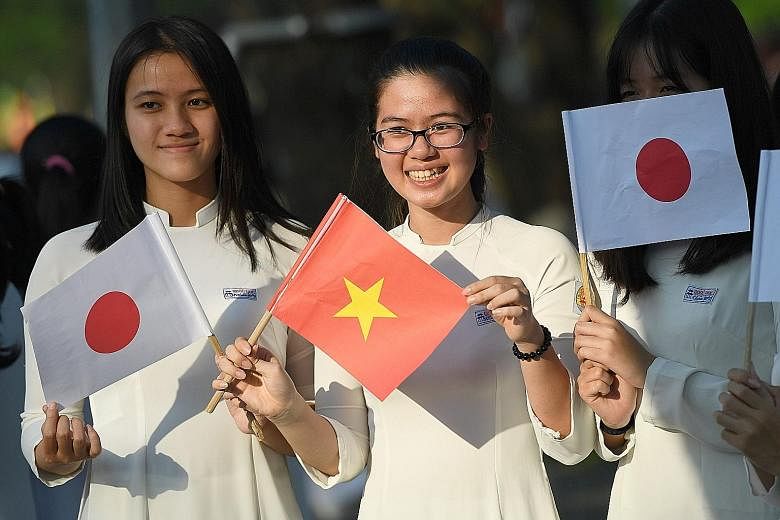HANOI • In a battle with China for influence and opportunity in South-east Asia, Japan is making inroads on a new front: education.
Japan is aggressively recruiting students from the region in the hope that they will help enhance economic ties with their home countries in the future. That is because South-east Asia is a key investment destination for the country - and an important source of talent.
Vietnamese especially are taking up the offers. The number of Vietnamese studying in Japan, including in language schools, grew more than 12-fold in the six years to last May, reaching about 54,000, according to the Japan Student Services Organisation (Jasso). They now account for nearly a quarter of international students in Japan, behind only Chinese students, who make up 41 per cent but whose numbers have levelled off in recent years.
Japan and China are both seeking bigger roles in South-east Asia, which boasts rapid economic growth and a large and expanding middle class. It also has huge demand for infrastructure. Japan's investment in the region has surged in recent years as political tensions and a slowing economy have reduced China's appeal, while Beijing has sought to strengthen trade ties with the Asian Infrastructure Investment Bank and the One Belt, One Road initiative.
Japan has made it a priority to recruit students from the Asean countries. A Japanese government scholarship has helped Ms Tran Thi Quynh My, an official at the State Bank of Vietnam, to pay for her two children's studies in the country.
"I chose Japan because it costs less than other countries while it has a good education system, instilling discipline in students," she said.
"After studying in Japan, my children will have a better chance to get good jobs when they come back to work in Vietnam, since there are more and more Japanese companies investing in our country."
-
25% of Japan's international students were from Vietnam last year
41% of students were from China
Vietnam's economy expanded by more than 6 per cent for a second year in 2016, making it one of the world's fastest-growing. Japanese companies are increasingly looking to South-east Asia, where incomes and consumption are likely to keep growing for years, said Mizuho Research Institute's senior economist Shinobu Kikuchi.
Japan is already Vietnam's third-biggest trading partner after China and the US. Two-way trade rose to about US$30 billion (S$41.5 billion) last year, almost double the US$16.8 billion in 2010, according to Vietnamese government data.
The two countries aim to boost bilateral trade to US$60 billion by 2020. Japan is also the second-biggest investor in Vietnam, with a total of US$42.5 billion of foreign direct investment as of March.
The growing presence of Japanese companies in Vietnam has students and their parents thinking about studying in Japan, with an eye on landing a good-paying job with a Japanese company, said Mr Itsuro Tsutsumi, director at Jasso's student exchange department.
"There are high expectations," Mr Tsutsumi said. "Their families are sending them as a means of investment, hoping the return will be big."
In the past, Japanese manufacturers have entered Vietnam in search of cheap labour but, in recent years, its growing domestic markets have attracted more non-manufacturers such as retailers, according to Mr Keisuke Kobayashi, who covers Vietnam at the Japan External Trade Organisation. Regardless of sector, Japanese companies are looking for employees who can bridge language and cultural gaps, Mr Kobayashi said.
"Our surveys with companies always show a challenge in hiring," he said.
BLOOMBERG

